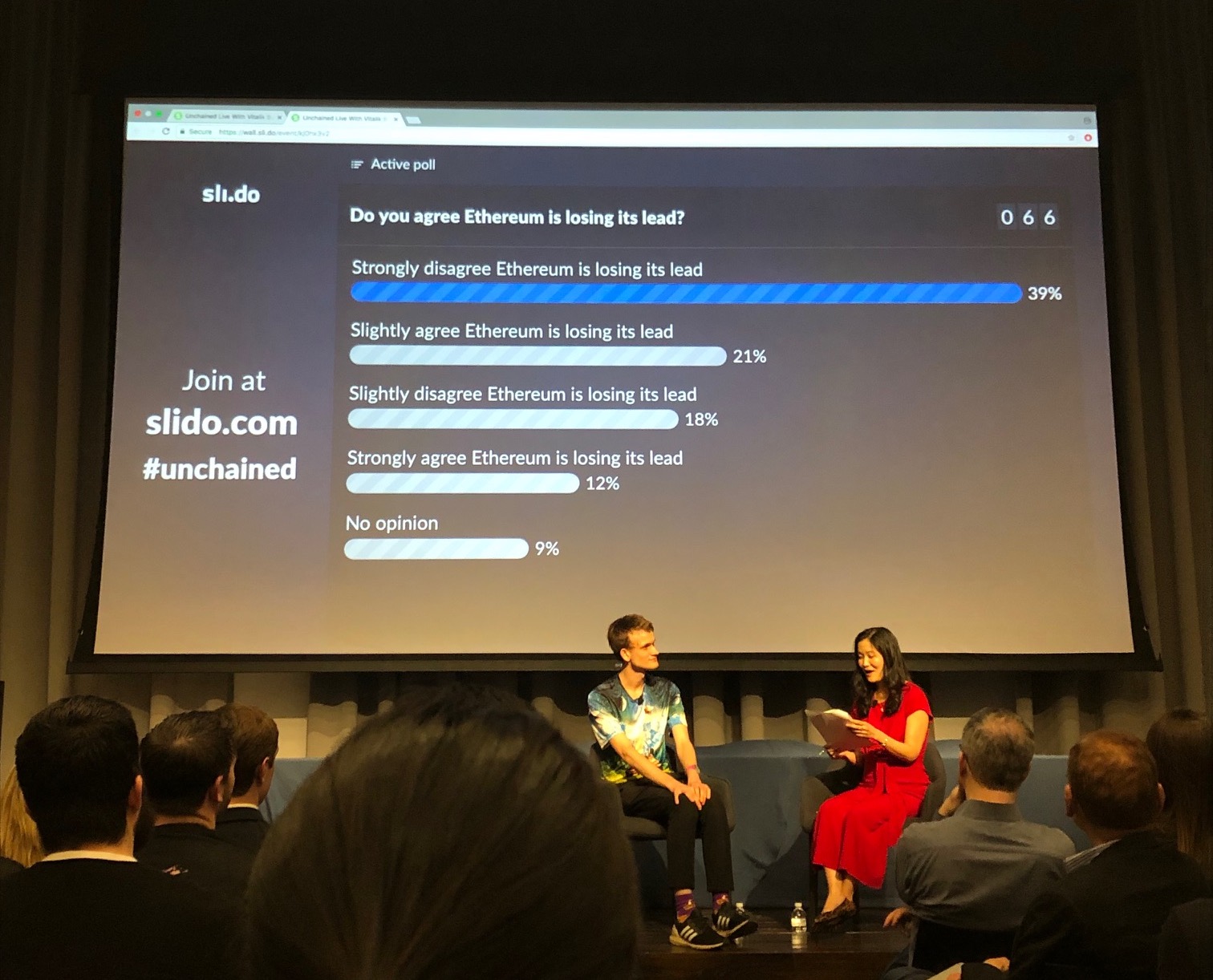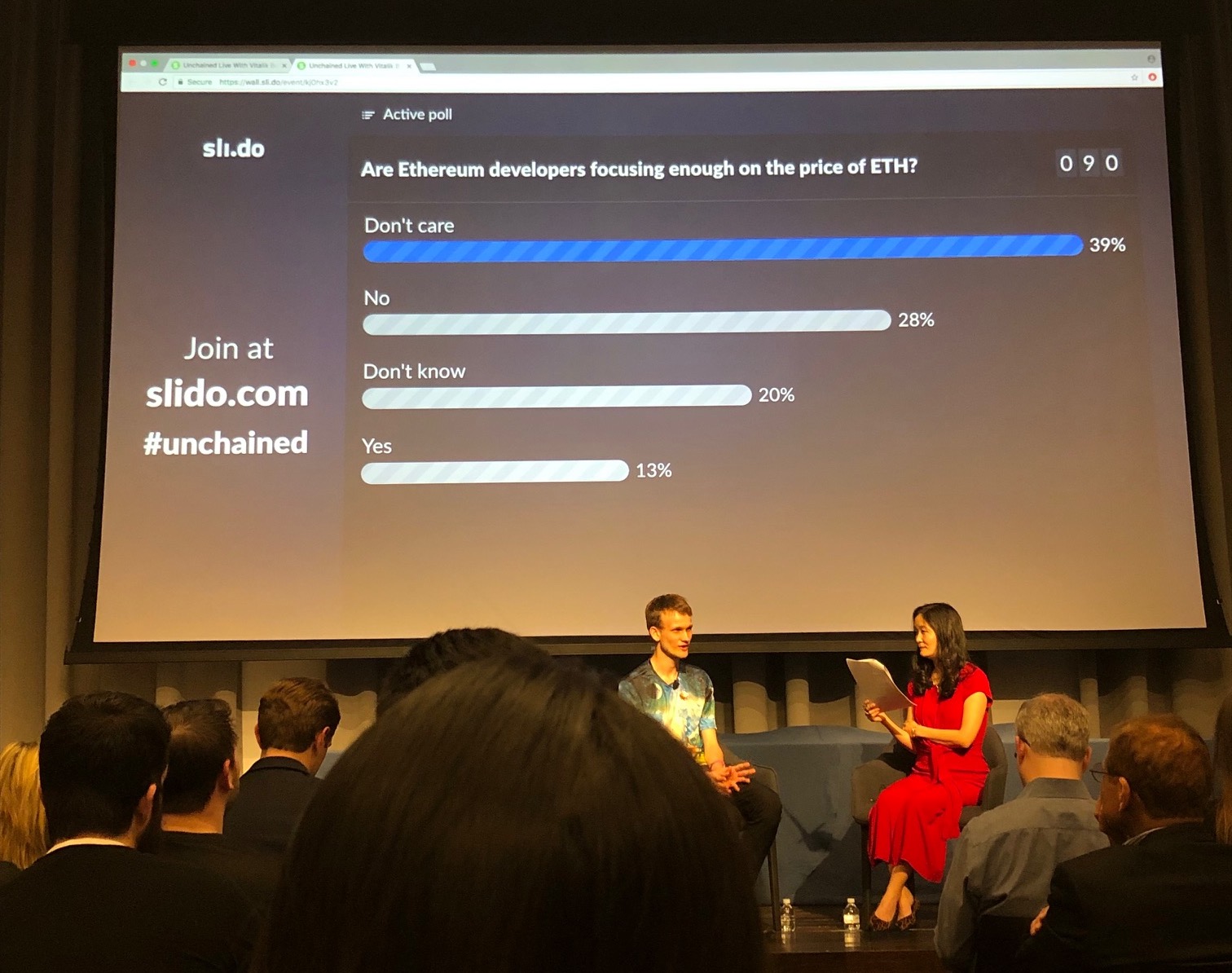Vitalik Buterin, wearing his traditional whimsical garb (a celestial T-shirt with some kind of animal on it), stands on stage next to Laura Shin, crypto journalist and host of the Unchained podcast. She’s wearing a tasteful, wide-legged red jumpsuit. They both look great. They sit down.
This is the first live taping of Unchained, which features interviews with prominent figures in crypto each week and is almost three years old. It’s fitting that it’s happening here, at the Columbia Graduate School of Journalism’s Pulitzer Hall. It’s where Shin got her journalism degree, and where her friends once had a dance party just down the hallway.
Get the BREAKERMAG newsletter, a weekly roundup of blockchain business and culture.
Shin and Buterin begin their talk, which will go on to cover Ethereum rivals, underpaid developers, and whether Buterin is concerned about security law violations. These are some of Buterin’s most piercing thoughts from the hour-long conversation.
On the competition:
Shin cuts right to the chase. “Is Ethereum losing its lead?” she asks.
Buterin seems ambivalent. “In terms of what our model is, there’s definitely been people from time to time who say we need to go in guns blazing,” he says. Then he puts on his “bro” voice: “Get ‘em to work for 16 hours every day and…we’ve got Ethereum 3.0, man.”
Ultimately, Buterin concedes that Ethereum is losing its lead “to some extent,” but says this is mainly because it’s an early project. As an industry matures, new projects emerge that learn from the projects that came before them. That’s just how it goes.
Shin asks the audience what they think:

The audience clearly loves Buterin. This maybe skews the results.
Even so, Buterin isn’t worried about Ethereum’s place in the ecosystem, even after Shin brings up “competing” efforts like Polkadot. New projects tend to wax optimistic in the early days, he says, like bitcoin sidechains. The idea was that bitcoin sidechains were going to “kill Ethereum,” says Buterin, but now there’s really only working bitcoin sidechain. “I’m definitely not worried about Polkadot replacing Ethereum.”
“Would you personally be upset if another blockchain takes the lead?” asks Shin.
“It depends which blockchain,” answers Buterin. He says relations are friendly between Ethereum and Zcash, and they’re “even warming with Ethereum Classic.” But if Tron overtakes Ethereum, he “will have lost a certain amount of hope for humanity.”
As for Ethereum’s most promising competitor, Buterin has a quick answer: Dfinity. “Dominic [Williams, the president and chief scientist of Dfinity] and I use the aspirational term ‘sister network.’”
Notably, Buterin also thinks people in the Ethereum community should criticize other community members. It’s how people learn.
On other crypto pioneers:
Buterin shows ample respect for Zooko Wilcox and Glen Weyl.
“Zcash is interesting,” says Buterin. “Great job, Zooko.” Buterin is also a big fan of Weyl’s quadratic finance mechanism, a spin on one of Weyl’s earlier ideas about community voting, which “takes into account the strength of people’s preferences.” (Governance-related topics are, of course, up for debate in many blockchain communities, including Ethereum, EOS and MakerDAO.)
As for Ameen Soleimani’s Moloch DAO, Buterin says “it’s definitely an interesting experiment.” Overall, though, Buterin sees nonprofit DAOs as “basically a way of organizing charity spending… unless [participants] are really, really altruistic, they’re going to be putting in far less money than would be optimal.” He doesn’t expect Moloch DAO to see “EOS-sized pools of money.”
On underpaid Ethereum developers:
The Ethereum Foundation has funded all kinds of projects, but a lot of Ethereum core developers are still making less money than they would working at a startup, says Shin.
Buterin points out that the Foundation didn’t “get out of hand” with money and have to double back with layoffs (like some other Ethereum organizations). “If nobody’s complaining,” he adds, “it means you’re overpaying.”
On the price of ether:
Do people in the community need to put more emphasis on ether’s price? “I’m going to be really candid,” says Buterin. “Some of the early rhetoric about the price not mattering at all…in part came from signaling [that Ethereum was] different from other projects that did pumping and Lambo-ing way too much.”
Ultimately, Buterin believes “projects will be better if prices go up.” So yeah, ether price matters. But the crowd doesn’t seem to care.

On Ethereum and the ICO bubble:
“ICOs are going to happen on some platform regardless of platform,” he says, lamenting the people who took selfies with him and ran away, only to later post the picture and list him as an advisor on their Ethereum-based project. “Those are definitely very unfortunate things,” says Buterin. “If there was a magic wand that could shut things down…”
On Ethereum’s crowdsale potentially violating securities law:
“We definitely have our lawyers and our legal team,” says Buterin. “We don’t have a reason to worry right now.”
On blockchains breaking monopolies:
If blockchains allow interoperability between a bunch of small companies and projects, together they can “stand up against larger monopolists without coalescing” into a monopoly themselves, Buterin insists.
On advice for Satoshi:
After some hemming and hawing, Buterin lands on his perfect answer: “Set explicit terms in writing.” In other words, lay out ideals for a system at its outset, so there are basic principles to adhere to as it evolves—as opposed to with bitcoin, where Satoshi essentially dropped a knowledge bomb with no ethical instructions and walked away, leaving a community prone to dramatic in-fighting.
After the Q&A between Shin and Buterin wraps up, Buterin throws a pullover over his exquisite t-shirt and heads for the door, a small posse behind him. One last person asks for a selfie with the Ethereum prophet before Buterin reaches the exit. Buterin agrees, almost smiles, and walks out into the night’s full moon.
This article has been updated to reflect that Laura Shin was wearing a jumpsuit, not a pantsuit. Also, for the curious, the animal on Buterin’s shirt was a “bufficorn.”